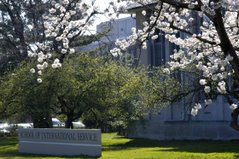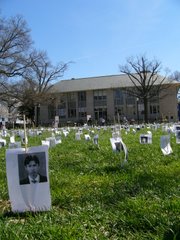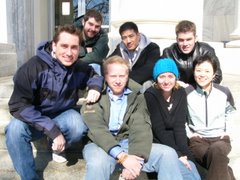Welcome to those of you who are checking out the blog for the first time. Although this is a new applications cycle, I encourage you to check out some our posts from the Fall 2007 cycle as they contain several valuable and enlightening entries, especially those regarding internships and the search for housing in DC. The old entries can be found at the bottom of the page under the "Older Posts" link.
I'm going to take some time now to discuss how to craft the best possible application you can. We get a lot of questions regarding what works and what doesn't on an application. The short answer is that all different kinds of applications can be successful. The long answer is that it depends on where you are coming from. First, it is not necessary that your undergrad degree be in International Relations or Political Science. We like to have a student body with a diverse array of backgrounds. I have a BS in Psychology, and I have met students here with degrees in such fields as Computer Engineering and Health Sciences. Also, while we don't have set "minimums", our admitted MA students typically have GPAs around 3.5. Their GRE scores are on average Verbal: 600, Quantitative: 660, Analytical: 5.
If you are applying right after receiving your BA, certain parts of your application will be more important than others. We are often asked by newly-graduated BA students whether their lack of work experience is an obstacle. Not necessarily. We primarily look for substantial work experience in applicants who have been out of school for a long time, say a year or more. That said, it always helps if you have done some kind of substantive internship during your undergrad work, but it won't kill you application if you haven't. The same goes for overseas experience. It always helps to have such experience, but it isn't a stark necessity. In the case of new BA grads, your GPA and GRE scores will come more into play, in place of a light resume. Again, not necessarily a bad thing, just a function of your place in life right now. If you are applying after having been out of school for a while, then you will be expected to have some degree of substantive work experience on your resume. This can often help to overcome GPAs and GRE scores that might fall below our averages (again, I emphasize averages, not minimums).
Finally, whether you are a new BA grad or someone who is coming back to school after a hiatus, two portions of your application will be crucial - the statement of purpose and the letters of recommendation.
First, your statement of purpose is the clearest picture we can have of who you are and why you and AU might fit well together. While anecdotal stories about "profound experiences" help us get to know you a little better, we like to hear more. A good statement of purpose is a clear articulation of your goals and interests as they relate to the programs at AU. You want to explain in a concise manner what it is that you hope to achieve by coming to AU. You also want to explain what you think makes you unique among the pool of applicants. Avoid vague or trite proclamations such as, "I have a strong interest in international affairs and a desire to affect change in (insert your favorite cause)." We all have that interest and desire, otherwise we wouldn't be applying to these programs. Be as specific as you can about your goals, what you can contribute to AU and to your chosen field, and how AU can help you on your way.
Second, your letters of recommendation should compliment your statement of purpose in giving us an idea of who you are personally, what drives you in your work, and what you are capable of accomplishing. I must emphasize that your letters should come from people who know you on at least a moderately personal level. The recommender should be able to attest to your motivation and personal character, as well as your academic/professional abilities. This seems rote, but you'd be surprised at how many letters we get that are three sentences long and go something like this, "(Your name) took my class in the spring of 2004. I really did not get a chance to know this person as the class was fairly large. However, (your name) received an A- and seems capable of doing good work." Professors will write these kinds of letters if they don't know you. They should just decline the request, and we often don't know why they agree to write the letters, but there you have it. This kind of letter does your application a disservice. If you don't have some kind of personal relationship with someone, DO NOT depend on them to write you a good letter. Find someone who knows you. If you are a new BA grad, letters from two professors will suffice, but if you've been in the working world for a time, one of your letters should come from a professional reference. However, the other one still has to be from a professor.
There you have it. Remember, we want your application to be successful. Although sending out deny letters is an inevitable part of the process, it truly does make for a sad week at the admissions office. So give us the best application you have, be confident in what you've sent us, and see what happens. Best of luck to all of you who apply. We hope to see you here in the Fall.
Mahalo,
Andy
SIS AUDIO LIBRARY
The SIS Audio Library allows you to hear recent speakers and professors, providing insight into current and relevant political and social issues of our time. Their expert instruction and a variety of guest speakers are just a click away at:
http://www.american.edu/sis/pouch/sisaudio.html
Wednesday, October 10, 2007
Subscribe to:
Post Comments (Atom)






No comments:
Post a Comment